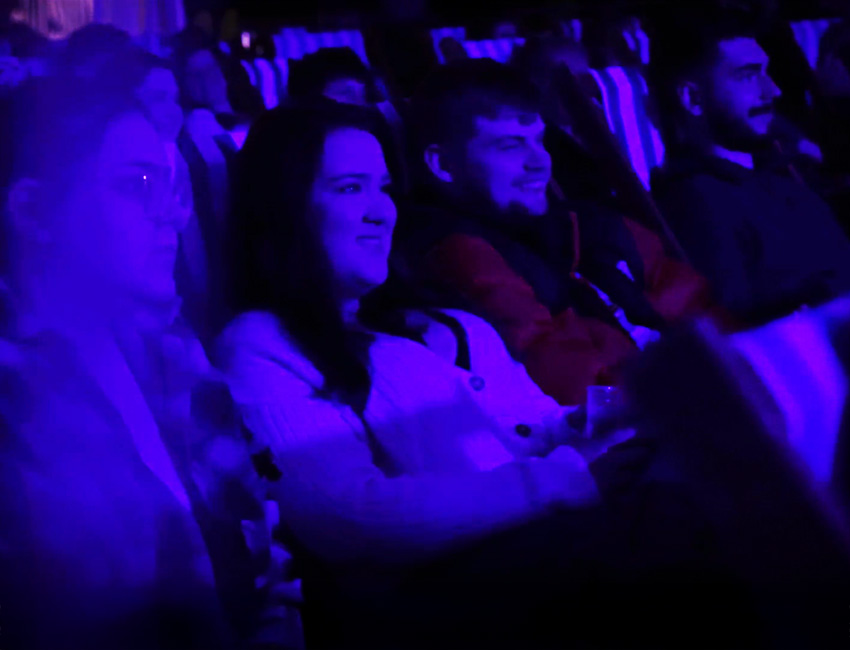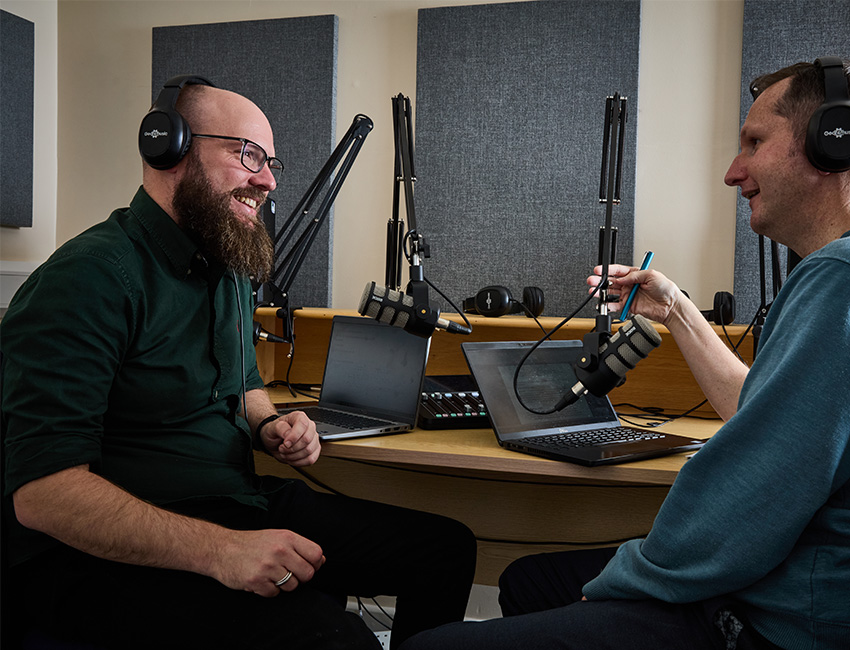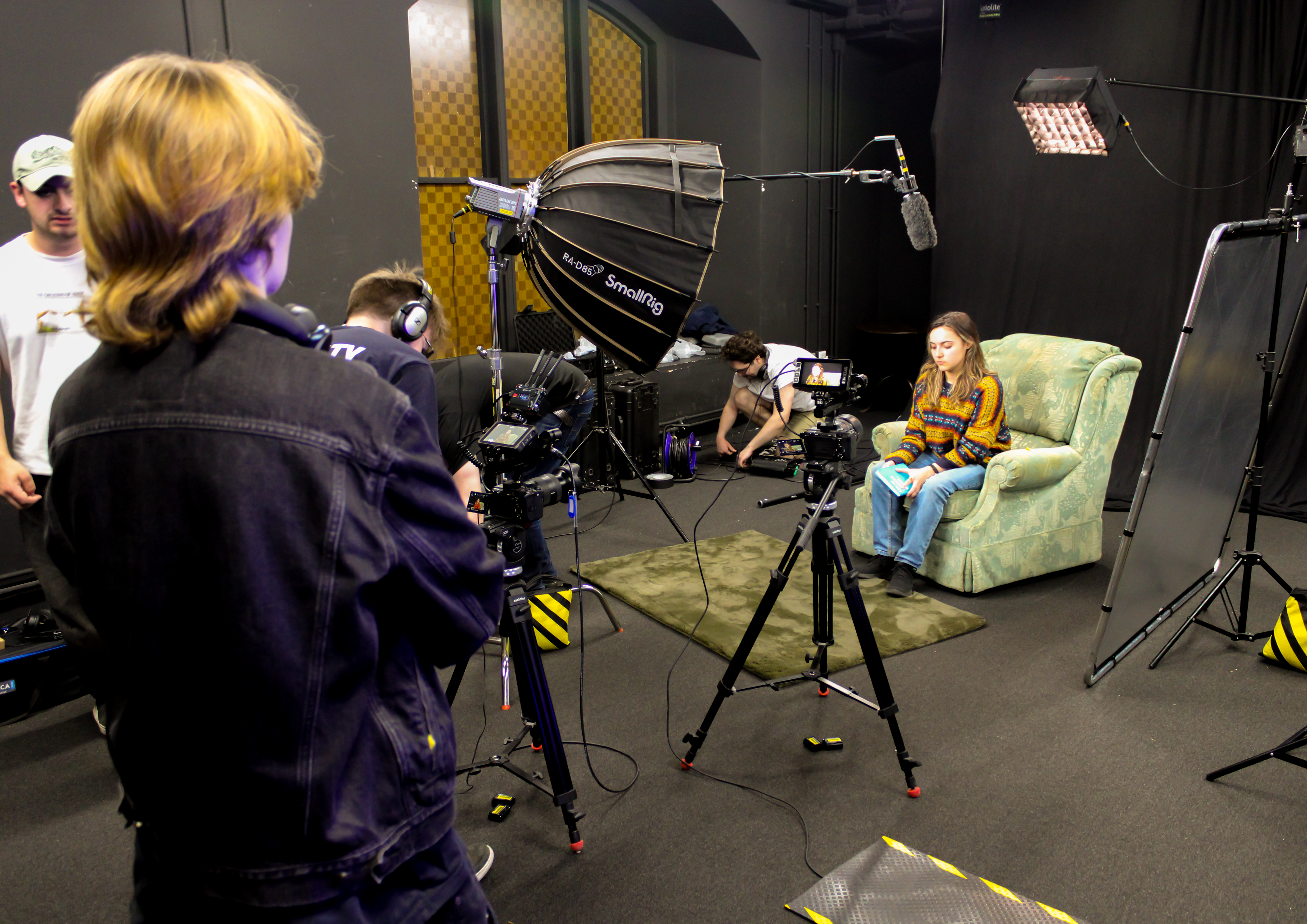At Worcester you’ll learn through of mix of lecture-based learning and meeting industry professionals. You’ll engage with digital marketing agencies, award-winning content creatives, various cultural and heritage organisations, and see various forms of creative media in action at festivals, cinemas and arcades.
for art and design teaching quality
Students feel free to express their opinions and beliefs
University of the Year finalist
Recognised for our graduate success, we’re shortlisted for University of the Year in the Times Higher Education Awards 2025.
Course overview
Media and Film Studies allows you to investigate the influence media and film has on society and its global impact. Beyond understanding the artistry behind current and past media, you’ll explore various film and media styles, genres and movements. You’ll investigate how these media forms reflect the society they were created in, and how they can influence how people think and act.
Media and film technologies have the potential to shape the world, and at Worcester we’ll introduce you to a variety of well-established and emerging fields and industries, including social media politics, marketing, and immersive media applications. You will be introduced to leading innovators in the media, technology and creative industries, and have the opportunity learn from professionals within digital marketing, content creation, cultural and heritage event industries and more. In your third year you'll have the opportunity to visit our partner university in Sweden, where you can gain first hand experience in international collaboration and exchange.
A key part of this course will be investigating how media and film represents our global community. You’ll consider gender, sexuality, age, class, disability and ethnicity as you explore how these are represented within film, media theories, forms and genres.
Discover the themes, core theories and critical concepts behind various forms of film and media. Learn about global screen cultures such as crime, sci-fi, horror, kawaii, manga and romance, and how production and distribution processes are adapted to the ways these forms of media are consumed by global audiences.
This course will develop your passion for film and media and help you discover or prepare you for your future career within the vast and diverse media industry.
Media and Film Studies
Course content
Throughout the course you’ll be an active researcher as you find case studies relevant to your interests and specialisms, to critically analyse and inspire your own creative work. You’ll have various opportunities to develop your own projects throughout the three years, which will come together to create your portfolio and build up your skillset in preparation for your final year project.
We regularly review our courses to reflect the latest research and developments in the subject area, as well as feedback from students, employers and the wider sector. As a result, modules may change to ensure the course remains current and relevant.
Optional modules will run if enough students choose to study them. It is not guaranteed that all modules will be offered every year.
Optional modules
Careers
The critical and creative thinking skills you’ll develop on this course will provide you with the foundation to either progress into further study, step into the film and media industry, or use your transferable skills to move into a variety of other careers outside of the industry.
You could also further develop your skills and knowledge on our MA Cultural Studies, Media and Culture MRes, Creative Media MA, Culture, Media and Film MPhil and PhD, or Film MRes courses.
Past graduates have gone on to work some of professional contacts in areas such as:
- Digital marketing and social media
- Public relations and local politics
- Radio presenting and journalism
- Television
- Events management
Student view
Course highlights
Teaching and assessment
Teaching includes a variety of methods such as interactive seminars, lectures, one-to-one tutorials, and hands-on skills sessions. The assessments are designed to help you develop your skillset and demonstrate your understanding, alongside providing the opportunity for you to develop your own ideas and projects for your portfolio.
Teaching and assessment contents
You will be taught through a combination of interactive lectures, seminars and workshops. You will also have the opportunity to develop your understanding by taking part in class trips, such as immersing yourself in a virtual reality gaming arcade or going behind the scenes at a local festival. You will also be invited to our course events which include exclusive film screenings and guest speakers.
You will develop your understanding of key concepts and theoretical ideas through discussion and debate with your lecturers and peers. We do not shy away from controversial topics, especially as they are often misrepresented in the media and films, but we pride ourselves on creating a safe, inclusive and respectful space where you'll feel supported and confident in sharing your thoughts.
We will teach you critical concepts and ideas from a variety of theoretical frameworks including black histories, intersectional feminisms and queer approaches, which will enable you to decode the media.
Some modules will be delivered through workshops which are designed to help you develop transferable skills, digital literacy and strategic career plans. This might include working on professional social networking through LinkedIn, industry-standard blogging platforms such as WordPress or creating content for TikTok.
Meet the team
Find out about our experienced lectures who will be teaching and supporting you through this course.
Entry requirements
UCAS tariff points required: 104
| Qualification | Grade |
|---|---|
| A-level | BCC |
| BTEC National Extended Diploma | DMM |
| T-level | M |
Additional entry requirements
Any questions?
If you have any questions about entry requirements, please call our Admissions Office on 01905 855111 or email admissions@worc.ac.uk.
Fees
Fees contents
UK and EU students
In 2026/27 the standard fee for full-time home and EU undergraduate students on BA/BSc/LLB degrees and FdA/FdSc degrees is £9,790 per year.
Tuition fees are reviewed annually and may increase each year for both new and continuing students.
For more details on course fees, please visit our course fees page.
International students
In 2026/27 the standard tuition fee for full-time international students enrolling on BA/BSc/LLB degrees and FdA/FdSc degrees is £17,200 per year.
Tuition fees are reviewed annually and may increase each year for both new and continuing students.
For more details on course fees, please visit our course fees page.
How to apply
How to apply contents
Applying through UCAS
UCAS is the central organisation through which applications are processed for full-time undergraduate courses in the UK.
Read our how to apply pages for more information on the application process, or if you’d like to apply for part-time study.
Contact
If you have any questions, please get in touch. We're here to help you every step of the way.

Admissions Office
admissions@worc.ac.uk01905 855111More to explore
Open Days
Visiting us is the best way to get a feel for student life at the University of Worcester.

The City of Worcester
Worcester is a welcoming university city with great transport links and plenty of student parking.

Accommodation
Benefit from our accommodation guarantee. We have rooms on campus to suit every budget including en-suite options.










